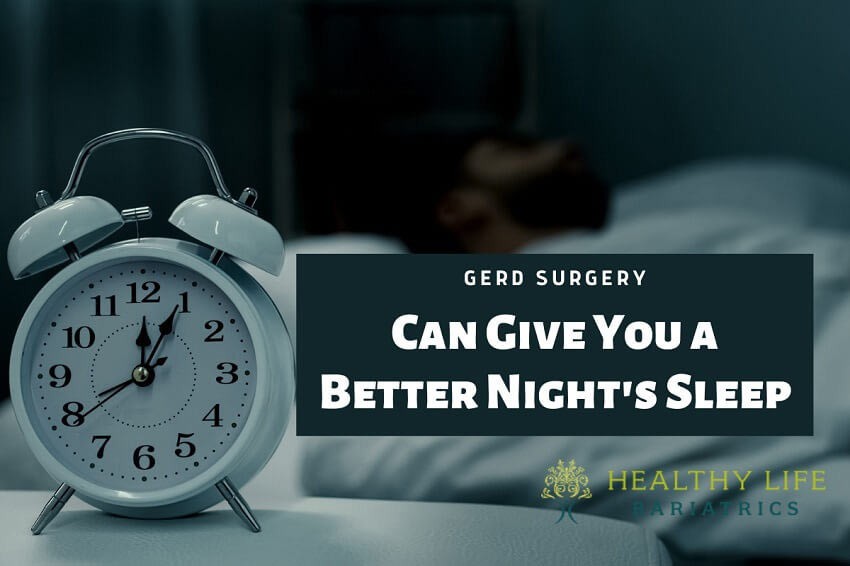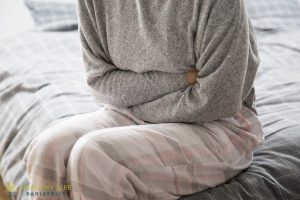
Introduction: GERD Surgery for Better Sleep
Heartburn is an uncomfortable condition that can cause pain and discomfort. Since heartburn most commonly occurs at night, the condition can also disturb your sleep. If you have ever laid awake at night with that deep burning in your chest, you know how painful heartburn can be. When heartburn becomes worse, it turns into GERD. Heartburn and GERD surgery can alleviate your pain, help you sleep better, and give you an improved quality of life. Keep reading to learn why people suffer from heartburn and GERD, and all the ways surgery can help.
If you don’t want to wait, schedule a consultation with Doctor Babak Moeinolmolki of Healthy Life Bariatrics. Dial (310)861-4093 to schedule a time that works best for you.
What is Heartburn and Why Does it Form?
Heartburn is a painful burning sensation in your chest. The pain originates behind the breastbone. In most cases, the discomfort comes on immediately after eating. Other times, the discomfort starts when lying down or bending over.
Many people experience heartburn at various times, especially at night. And for most, it’s not a big deal. The pain can often be managed with nonprescription medications and lifestyle changes, such as staying away from overly spicy foods.
When heartburn becomes a frequent occurrence, and particularly when it interferes with your daily routine, and sleep, these are signs that heartburn has turned serious. Medical care is advised.
Causes of Heartburn
Heartburn is caused by stomach acid backing up into the esophagus, which is the tube that carries food from your mouth into your stomach. When food is swallowed, a band of muscle around the bottom of the esophagus relaxes. This allows food and liquid to flow into the stomach. The muscle, referred to as a lower esophageal sphincter, then tightens again, preventing a backup from occurring.
When the lower esophageal sphincter malfunctions, stomach acid is allowed to back up into the esophagus. This is what we call acid reflux. People who suffer from acid reflux tend to experience greater pain and discomfort when lying down or bending over.
What are the Primary Symptoms of Heartburn?

People who suffer from heartburn experience a burning in the chest, usually after eating. Many people experience heartburn at night, which prevents rejuvenating sleep. The pain could worsen when lying down or bending over. There may also be a bitter or acidic taste in the mouth.
When Should You See a Doctor About Heartburn?
Pain in the chest does not always signify heartburn. Chest pain is also a symptom of a heart attack. You should seek medical care immediately if the pain in your chest becomes severe or if you feel immense pressure. Heart attack pain and pressure typically extend into the arm and jaw and may be accompanied by difficulty breathing.
You should contact a doctor about heartburn if the symptoms occur more than twice per week. A doctor will also want to know if you have attempted to use nonprescription medications, such as antacid tablets, but to no avail. Other severe heartburn symptoms include difficulty swallowing, persistent nausea and vomiting, and weight loss due to poor appetite or difficulty eating.
What Risk Factors Can Trigger Heartburn?
Heartburn can be exacerbated by certain foods and drinks. Spicy foods, onions, citrus products, tomato products, such as ketchup, fried foods, chocolate, peppermint, and alcohol can make heartburn occur. Large or fatty meals are another risk factor that should be avoided if you tend to be a heartburn sufferer.
The risk of heartburn increases in those who are overweight and pregnant.
What if Heartburn Goes Untreated?
Heartburn that is left to worsen can cause a number of complications. Heartburn that occurs frequently can interfere with your quality of life. This is known as GERD (gastroesophageal reflux disease).
What is GERD?
Gastroesophageal reflux disease is a digestive disorder that affects the lower esophageal sphincter. The symptoms of GERD include heartburn and acid indigestion.
Some doctors suspect that GERD forms on account of a hiatal hernia.
What is a Hiatal Hernia?
A hiatal hernia occurs when the upper portion of your stomach bulges through the muscle separating your abdomen and chest. This area is known as the diaphragm. The diaphragm has a tiny opening known as a hiatus. This is where the esophagus passes before connecting to your stomach. With a hiatal hernia, the stomach is able to push through the hiatus and into the chest.
For most people, a small hiatal hernia is harmless. You may not know you suffer from the condition until a doctor finds it with an imaging test, and usually when checking for another condition.
Large Hiatal hernias can allow food and acid to back up into the esophagus. This can lead to heartburn and, eventually, GERD.
Read our article: Do You Need Hernia Surgery? 10 Hernia Symptoms to Look For
What is the Difference Between Acid Reflux, Heartburn, and GERD?

Acid reflux is when contents of the stomach, such as food or stomach acid, traverse in the wrong direction. In some cases, a mixture of food and acid will travel from your stomach into your throat through the esophagus. When you have acid reflux, you might taste food and stomach acid in the back of your throat. This can make you feel sick. The condition is also sometimes referred to as GER or gastroesophageal reflux.
Heartburn is when acid reflux causes the pain we associate with heartburn symptoms. The pain originates behind your breastbone but can also appear in your neck or throat. The feeling is usually worse after eating, when lying down, or by bending over. Being pregnant or overweight makes heartburn more likely to occur.
GERD is more serious than heartburn. Gastroesophageal reflux disorder is caused by acid reflux and can lead to heartburn. If you suffer from heartburn more than twice weekly, you likely suffer from GERD.
GERD occurs when the lower esophagus weakens or relaxes when it shouldn’t. The symptoms of GERD include heartburn, chest pain, regurgitation, trouble swallowing, and shortness of breath.
GERD may require prescription medication. In severe cases, GERD may require surgery or other procedures.
What are GERD Treatment Options?
GERD can be treated with lifestyle changes, medications, and GERD surgery.
Lifestyle Changes
Changing certain factors of your life can help you manage GERD symptoms and may relieve them entirely. This includes maintaining a healthy weight, quitting smoking, avoiding heavy meals at night, and waiting a few hours after eating before lying down. Elevating your head during the night can also help.
Medications
Doctors occasionally suggest taking over-the-counter medications before resorting to prescription medications to manage GERD symptoms.
Antacids
Antacid tablets, such as Tums, can be used occasionally for mild GERD symptoms. If you find yourself taking antacid tablets daily, you may require stronger medication.
H2 Receptor Blockers
H2 receptor blockers like Pepcid AC can lower the amount of stomach acid that is formed in your body. Many of these receptor blockers are available over the counter (OTC), though higher doses can also be prescribed by your doctor.
Proton Pump Inhibitors
PPIs lower the amount of acid in your stomach. These tend to work better than H2 blockers and are more effective when it comes to healing the esophageal lining that can become damaged when GERD symptoms persist.
GERD Surgery
When lifestyle changes and medications are not enough to control the symptoms of GERD, your doctor may recommend surgical intervention.
Surgery is especially recommended if you have developed complications from GERD. Examples include adult-onset asthma, stricture (narrowing of the esophagus), Barrett’s Esophagus (pre-cancerous changes to the esophagus), regurgitation of acid into the lungs, and esophagitis (inflammation of swelling of the esophagus).
Multiple types of surgery are available to treat GERD. These include fundoplication and bariatric surgery.
Read our article: Top Surgical Procedures for Hernias, Gallbladder Issues, and GERD
What is Fundoplication?
This GERD surgical procedure aims to strengthen the lower esophageal sphincter (LES). During fundoplication, a portion of the stomach (the fundus) is removed. The piece of tissue is then wrapped around the LES. This supports the muscles of the LES, helping them work more effectively. The surgery is meant to prevent food and liquids from backing up into the esophagus and, eventually, the throat.
Fundoplication is performed laparoscopically or with open surgery.
Laparoscopic Fundoplication
Laparoscopic fundoplication is considered minimally invasive because small incisions are used along with small surgical tools. Unlike open surgery, where a single lengthened incision I used to open the upper abdomen, the small incisions function as entry points for serpentine-like tools. One of these tools is fitted with a camera, allowing the surgeon to view the procedure on a monitor in the operating room. The other tools allow the surgeon to robotically operate on the stomach and esophagus with minimal risk and lowered downtime.
After surgery, patients are able to return to work much faster than they would with open fundoplication. There is a shorter stay in the hospital, and the operation produces very small scars. There is also less pain overall.
In some cases, laparoscopic fundoplication is not possible because of risk factors, such as obesity and scar tissue on the abdomen.
Transoral Incisionless Fundoplication
TIF is a procedure used when other surgical techniques may not be appropriate. It is considered less invasive than even laparoscopic surgery because no incisions are necessary. Instead, the esophagus is accessed with a device that is inserted into the mouth and down into the throat.
During TIF, the tissue at the end of the esophagus is folded to create a new valve. This newly formed valve helps to prevent the contents of the stomach from backing up into the esophagus.
Stretta Procedure
This is another procedure that involves accessing the esophagus through the throat. An endoscope (flexible tube with a light on the end) is inserted into the mouth and down into the esophagus. The surgeon uses the endoscope to heat up the esophagus using radiofrequency energy. This creates cuts that eventually heal to form scar tissue. This is effective for two reasons.
First, the scar tissue reinforces the muscles, and it also blocks the nerves that react to acid backing up into the esophagus.
The Stretta procedure takes about an hour and is performed on an outpatient basis.
Bariatric Surgery

Since obesity is a strong risk factor for GERD, obesity surgery (bariatric surgery) is sometimes considered an effective GERD treatment.
Roux-en-Y gastric bypass surgery is usually recommended for patients suffering from GERD with a body mass index (BMI) over 30. Roux-en-Y gastric bypass is an effective treatment for obesity and obesity-related comorbidities, which can include heartburn and GERD.
During the procedure, which is performed laparoscopically, the upper portion of the stomach is reduced to a small pouch the size of an egg. The surgeon performs the surgery by stapling off the upper section of the stomach from the bottom. The effect of this technique reduces the amount of food you can eat.
The smaller stomach pouch is then attached directly to a portion of your small intestine known as the Roux limb. This forms a Y shape, which is where Roux-en-Y gets its name. The food you eat bypasses the rest of the stomach and the upper portion of your small intestine. This reduces the number of calories and fat your body can absorb from your daily diet. It also reduces the number of vitamins and minerals you are able to absorb. In some cases, you may be recommended to consume a daily multivitamin to compensate for the reduced intake of vitamins and minerals.
Following gastric bypass surgery, patients typically experience relief from acid reflux symptoms and increased quality of life. Studies also show reduced long-term mortality due to the resolution of obesity-related comorbidities.
Get Help for GERD in Los Angeles, California
If you suffer from severe heartburn or GERD that makes getting a good night’s sleep impossible, help is available. The first step is to schedule a consultation with world-renowned surgeon Doctor Babak Moeinolmolki of Healthy Life Bariatrics. Doctor Moeinolmolki is the only dual-board-certified surgeon in Southern California that is trained in both minimally invasive techniques and body contouring surgery. That means you can undergo surgery for GERD, Hiatal hernias, and bariatric (weight loss) surgery all under one roof. Doctor Moeinolmolki is also trained in post-bariatric body contouring surgery, which is helpful for skin removal and the recontouring of the body after weight loss surgery has been successful.
Learn more by scheduling your appointment with Doctor Moeinolmolki. Dial (310)861-4093 to choose a time that works best for you. A better night’s sleep awaits.


